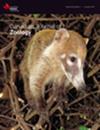Alteration of a temperate forest invertebrate community by invasive Japanese Barberry (Berberis thunbergii) has limited influence on the diet composition of territorial Ovenbirds (Seiurus aurocapilla)
IF 1.1
4区 生物学
Q3 ZOOLOGY
引用次数: 0
Abstract
Invasive species are widely implicated in the decline of songbird populations, potentially via indirect effects such as the restructuring of ecological communities by non-native plants. We used stable isotope analysis to investigate whether ground-foraging, generalist insectivore Ovenbirds (Seiurus aurocapilla Linnaeus, 1766) shifted diets following invasion by a non-native shrub, Japanese Barberry (Berberis thunbergii DC), in a temperate woodland system in New York, USA where barberry was previously linked to trophic downgrading in the leaf litter arthropod community. Assimilated Ovenbird diets were primarily composed of predatory invertebrates followed by sucking herbivores, chewing herbivores, and detritivores. The only notable changes in assimilated Ovenbird diets were a modest 14.7% decrease in chewing herbivore contributions and a minor 7.0% increase in sucking herbivore contributions in forest patches with high barberry densities. Our results indicate that the effects of non-native plants on connections between higher trophic levels are context dependent, and comparisons with other studies suggest that community complexity and time since introduction are key contextual differences that affect the outcome of an invasion. Our results may reflect compensatory shifts in individual foraging effort by Ovenbirds, but, in combination with our previous research, provide little evidence that barberry affects Ovenbird condition and therefore downstream outcomes.入侵的日本小檗(Berberis thunbergii)对温带森林无脊椎动物群落的改变对领土鸟(Seiurus aurocapilla)的饮食组成影响有限。
入侵物种与鸣禽种群的减少有广泛的关系,可能是通过非本地植物对生态群落的重建等间接影响。在美国纽约的温带林地系统中,我们使用稳定同位素分析来调查在非本地灌木日本小檗(Berberis thunbergii DC)入侵后,地面觅食的一般食虫鸟(Seiurus auroccapilla Linnaeus, 1766)是否改变了饮食,在那里小檗与凋落叶节肢动物群落的营养退化有关。被同化的炉鸟的饮食主要由掠食性无脊椎动物组成,其次是吸吮食草动物、咀嚼食草动物和营养动物。同化炉鸟的饮食中唯一显著的变化是,在小檗密度高的森林斑块中,咀嚼食草动物的贡献减少了14.7%,吸吮食草动物的贡献增加了7.0%。我们的研究结果表明,非本地植物对高营养水平之间联系的影响依赖于环境,并且与其他研究的比较表明,自引入以来的群落复杂性和时间是影响入侵结果的关键环境差异。我们的研究结果可能反映了个体觅食努力的代偿性变化,但是,结合我们之前的研究,几乎没有证据表明小檗会影响候鸟的状况,从而影响下游的结果。
本文章由计算机程序翻译,如有差异,请以英文原文为准。
求助全文
约1分钟内获得全文
求助全文
来源期刊

Canadian Journal of Zoology
生物-动物学
CiteScore
2.40
自引率
0.00%
发文量
82
审稿时长
3 months
期刊介绍:
Published since 1929, the Canadian Journal of Zoology is a monthly journal that reports on primary research contributed by respected international scientists in the broad field of zoology, including behaviour, biochemistry and physiology, developmental biology, ecology, genetics, morphology and ultrastructure, parasitology and pathology, and systematics and evolution. It also invites experts to submit review articles on topics of current interest.
 求助内容:
求助内容: 应助结果提醒方式:
应助结果提醒方式:


